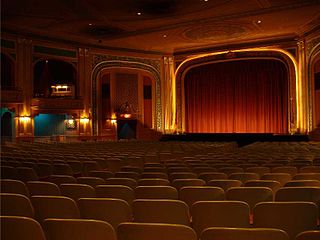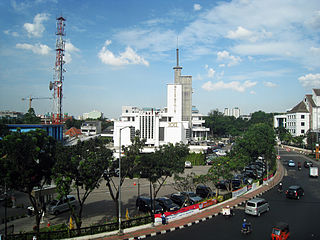
A Bioscope show was a music hall and fairground attraction consisting of a travelling cinema. The heyday of the Bioscope was from the late 1890s until World War I.

A Bioscope show was a music hall and fairground attraction consisting of a travelling cinema. The heyday of the Bioscope was from the late 1890s until World War I.
Bioscope shows were fronted by the largest fairground organs, [1] and these formed the entire public face of the show. A stage was usually in front of the organ, and dancing girls would entertain the crowds between film shows. [2]
Films shown in the Bioscope were primitive, and the earliest of these were made by the showmen themselves. Later, films were commercially produced.
Bioscope shows were integrated, in Britain at least, into the Variety shows in the huge Music Halls which were built at the end of the nineteenth century.
After the Music Hall Strike of 1907 in London, bioscope operators set up a trade union to represent them. There were about seventy operators in London at this point.
In South Africa "Bioscope" or in Afrikaans "bioskoop" is an archaic word for the cinema and some people (especially older generations) still use it regularly. Bioscopes and biocafes which served food and drink as you watched the film, dating back to the 1940s and 50s closed in the 1970’s, mostly due to the arrival of television in South Africa in 1976 which caused cinema attendances to severely drop. [3]
In modern-day Dutch, "bioscoop" is a wide-spread term, and the equivalent of the English "movie theater" or "cinema".
In Serbian language, "bioskop" is a modern term for movie theater.
In modern-day Indonesian Language, "bioskop" is a modern term for movie theater, adopted from the Dutch during the colonial era.

A silent film is a film with no synchronized recorded sound. Though silent films convey narrative and emotion visually, various plot elements or key lines of dialogue may, when necessary, be conveyed by the use of title cards.

A movie theater, cinema, or cinema hall, also known as a movie house, picture house, the movies, the pictures, picture theater, the silver screen, the big screen, or simply theater is a building that contains auditoria for viewing films for entertainment. Most, but not all, movie theaters are commercial operations catering to the general public, who attend by purchasing tickets.

The Odeon Luxe West End is a two-screen cinema on the south side of Leicester Square, London. It has historically been used for smaller film premieres and hosting the annual BFI London Film Festival. The site is on an adjacent side of the square to the much larger flagship Odeon Luxe Leicester Square.

The film industry or motion picture industry comprises the technological and commercial institutions of filmmaking, i.e., film production companies, film studios, cinematography, animation, film production, screenwriting, pre-production, post production, film festivals, distribution, and actors. Though the expense involved in making films almost immediately led film production to concentrate under the auspices of standing production companies, advances in affordable filmmaking equipment, as well as an expansion of opportunities to acquire investment capital from outside the film industry itself, have allowed independent film production to evolve.

A projectionist is a person who operates a movie projector, particularly as an employee of a movie theater. Projectionists are also known as "operators".

The Lafayette Theatre is a nationally acclaimed movie palace located in downtown Suffern, New York, built in 1923. Its primary function is first-run movies, but it also houses special events like its popular weekly Big Screen Classics film shows. It is also notable for housing a Wurlitzer theatre organ, which is played before Big Screen Classics shows.

A fairground organ is a French pneumatic musical organ covering the wind and percussive sections of an orchestra. Originated in Paris, France, it was designed for use in commercial fairground settings to provide loud music to accompany rides and attractions, mostly merry-go-rounds. Unlike organs for indoor use, they are designed to produce a large volume of sound to be heard above the noises of crowds and fairground machinery.

Max Skladanowsky was a German inventor and early filmmaker. Along with his brother Emil, he invented the Bioscop, an early movie projector the Skladanowsky brothers used to display a moving picture show to a paying audience on 1 November 1895, shortly before the public debut of the Lumière Brothers' Cinématographe in Paris on 28 December 1895.

The Roxy Theatre was a 5,920-seat movie palace at 153 West 50th Street between 6th and 7th Avenues, just off Times Square in New York City. It was the largest movie theater ever built. It opened on March 11, 1927 with the silent film The Love of Sunya starring Gloria Swanson. It was a leading Broadway film showcase through the 1950s and also noted for its lavish stage shows. It closed and was demolished in 1960.

A street organ played by an organ grinder is a French-German automatic mechanical pneumatic organ designed to be mobile enough to play its music in the street. The two most commonly seen types are the smaller German and the larger Dutch street organ.

The Plaza Super Cinema and Variety Theatre cinema in Stockport, England opened in 1932 and is now a Grade II* listed building. After being a bingo hall for many years, it has now been restored as a cinema and theatre, showing classic films and staging live shows.

A film – also called a movie, motion picture, moving picture, picture, photoplay or (slang) flick – is a work of visual art that simulates experiences and otherwise communicates ideas, stories, perceptions, feelings, beauty, or atmosphere through the use of moving images. These images are generally accompanied by sound and, more rarely, other sensory stimulations. The word "cinema", short for cinematography, is often used to refer to filmmaking and the film industry, and to the art form that is the result of it.

The Modern Theatre is located on Washington Street in downtown Boston, Massachusetts. It opened as a movie theater in 1914 in a former commercial building that had been repurposed by noted theater architect Clarence H. Blackall. In 2009 Suffolk University demolished the long-vacant building after removing and storing the facade, and constructed a new building on the site. Suffolk's new Modern Theatre opened on November 4, 2010.

The Music Box Theatre is a historic movie theater located in Chicago, Illinois. Built in 1929, it has been operating continuously as an art-house and repertory cinema since the early 1980s.

Metropole is a historic multipurpose building complex in Jakarta, Indonesia. At present Metropole is the oldest surviving movie theater in Jakarta. One of its main tenants is the 21 Cineplex group, which operates the Metropole XXI movie theater in the complex's main building. As a historic cinema, it has screened films during the first Indonesian Film Festival (1955) and the 16th Asia Pacific Film Festival (1970). Metropole was listed as an architectural heritage site by the governor in 1993.

The Cinema of South India refers collectively to the six distinct film industries based in Southern region of India — namely Tamil, Telugu, Malayalam, Kannada, Tulu and Konkani. Although these industries developed independently for a long period of time, gross exchange of artists and technicians, as well as globalisation helped in shaping this unique identity.

De Voortrekkers is a 1916 silent film recognized as the first epic in South Africa's motion-picture history and also that nation's oldest surviving feature film. Produced by African Film Productions and directed by Harold M. Shaw, it portrays the Boers' "Great Trek" of the 1830s, concluding with a hegemonic recreation of the Battle of Blood River that occurred on 16 December 1838, when a few hundred armed Afrikaners defeated several thousand Zulus. Descendants of the Dutch-speaking voortrekkers or "pioneers" who participated in the Great Trek revered the film and used it to commemorate the event, which forms part of a highly contentious period in South Africa's history. Afrikaners presented it in school classrooms for decades and screened it annually at social events marking the battle's anniversary.
Jules Greenbaum was a German pioneering film producer. He founded the production companies Deutsche Bioscope, Deutsche Vitascope and Greenbaum-Film and was a dominant figure in German cinema in the years before the First World War. He is also known for his early experiments with sound films around twenty years before the success of The Jazz Singer made them a more established feature of cinema.

The American Theatre Organ Society (ATOS) is an American non-profit organization, dedicated to preserving and promoting the theatre pipe organ and its musical art form.

Randall Kay Williams was a Victorian showman noted for popularising moving pictures on British fairgrounds. The first known reference to a cinematograph exhibition in Williams' show was at Rotherham Statute Fair on 2 November 1896.